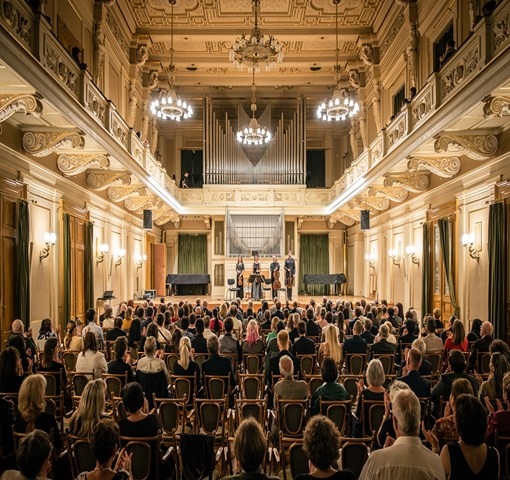Trains as a symbol of departure, arrival and return were the main theme of the second edition of the International Festival of Jewish Culture ŠTETL FEST, which took place at the end of August and beginning of September. The four-day program combined the historical events of Jewish citizens taken from Brno to concentration camps during World War II with the modern stories of Ukrainians who fled to the city from the war in their country. To commemorate these events, the Memorial to the Disappeared was unveiled at the opening of the festival at Brno's main railway station and visitors can see the exhibition entitled Stories from Ukraine in various Brno locations until the end of September. The final concert directed by the Škampa Quartet under the title Trains, held on Sunday 3 September at the Besední dům, was a meaningful end to the festival, during which the question of leaving and returning was musically and historically reinforced.
The dramaturgy of the evening was based on two major works from both early and contemporary music, which were in their context or content in harmony with the main motif of ŠTETL FEST. The first piece on the programme was String Quartet No.13 in B flat major, Op. 130 by Ludwig van Beethoven, originally written for the patron and amateur cellist Nikolai Golitsyn. The original version of the quartet ended with the so-called Great Fugue, which Beethoven separated after the première and made into a separate piece with the opus number 133. The composer wrote a new, lighter finale in November 1826 and died shortly afterwards in March the following year. However, the story of the manuscript of the fourth movement is also linked to this work, which permeates the intricate fates of its owners, especially the Petschek family. From the confiscation of a shipment to Switzerland in 1939, where Beethoven's manuscript was located, to the appropriation of the Petscheks' property by the Protectorate of Bohemia and Moravia in 1942 and then the manuscript being kept for many years in today's Moravian Museum, it was only in 2022 that the treasure was returned to the family under the law on the mitigation of certain property injustices caused by the Holocaust.
The Škampa Quartet, composed of Petra Brabcová (violin), Adéla Štajnochrová (violin), Martin Stupka (viola) and Lukáš Polák (cello), impressed the audience with their technical refinement, classical lightness, sophistication, but also predatory nature and a certain amount of romance. Adéla Štajnochrová, who appeared as first violin in the Beethoven Quartet, bravely controlled the sometimes soloistically led part - technically very demanding - especially in the second movement. The ensemble played not only with the different characters of all six movements of the piece, but also with the tempo, with which it worked unusually well on the basis of rubato. In less than fifty minutes of music, the Škampa Quartet showed its flexibility through energetic and effective passages, cantabile lines and the playful dance character of certain movements, supported by the absolute musical connection of the ensemble members.
The second half of the evening was devoted to the 1988 composition Different Trains by American composer Steve Reich, originally written for the Kronos Quartet. One of the representatives of musical minimalism, Reich combines the characteristic compositional methods of this movement with specific work using tape loops. The main theme of the composition is trains depicting different stories of people (including the young Reich himself) processed into three attacca movements. Through spoken fragments, with which Reich works on the principle of speech cues, the piece captures the personal memories of Holocaust and World War II survivors. As already described, the basis is the recording into which the musicians integrate. Individual repetitions and melodic-rhythmic formations interrupt the spoken parts, from which the composer created melodic motifs that are gradually taken over by the instruments. The atmosphere of the trains is evoked by the pulsations, the characteristic rhythm and the sounds of historical train whistles that permeate the entire work. To hear the work live is clearly a powerful musical experience, which, performed by the Škampa Quartet, represented a more than worthy conclusion to the International Festival of Jewish Culture ŠTETL FEST.
Program:
Ludwig van Beethoven - String Quartet No.13 Op. 130
Steve Reich - Different Trains
Škampa Quartet
3 September 2023 at 8 pm, Besední dům

































No comment added yet..